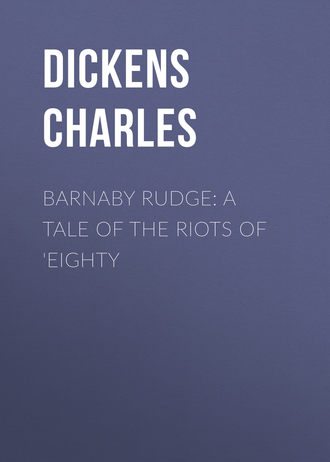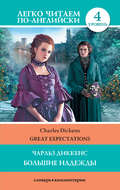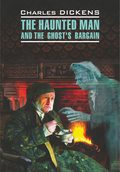
Чарльз Диккенс
Barnaby Rudge: A Tale of the Riots of 'Eighty
But on they went, not the less merrily for this, and there was the locksmith in the incautious fulness of his heart ‘pulling-up’ at all manner of places, and evincing a most intimate acquaintance with all the taverns on the road, and all the landlords and all the landladies, with whom, indeed, the little horse was on equally friendly terms, for he kept on stopping of his own accord. Never were people so glad to see other people as these landlords and landladies were to behold Mr Varden and Mrs Varden and Miss Varden; and wouldn’t they get out, said one; and they really must walk upstairs, said another; and she would take it ill and be quite certain they were proud if they wouldn’t have a little taste of something, said a third; and so on, that it was really quite a Progress rather than a ride, and one continued scene of hospitality from beginning to end. It was pleasant enough to be held in such esteem, not to mention the refreshments; so Mrs Varden said nothing at the time, and was all affability and delight – but such a body of evidence as she collected against the unfortunate locksmith that day, to be used thereafter as occasion might require, never was got together for matrimonial purposes.
In course of time – and in course of a pretty long time too, for these agreeable interruptions delayed them not a little, – they arrived upon the skirts of the Forest, and riding pleasantly on among the trees, came at last to the Maypole, where the locksmith’s cheerful ‘Yoho!’ speedily brought to the porch old John, and after him young Joe, both of whom were so transfixed at sight of the ladies, that for a moment they were perfectly unable to give them any welcome, and could do nothing but stare.
It was only for a moment, however, that Joe forgot himself, for speedily reviving he thrust his drowsy father aside – to Mr Willet’s mighty and inexpressible indignation – and darting out, stood ready to help them to alight. It was necessary for Dolly to get out first. Joe had her in his arms; – yes, though for a space of time no longer than you could count one in, Joe had her in his arms. Here was a glimpse of happiness!
It would be difficult to describe what a flat and commonplace affair the helping Mrs Varden out afterwards was, but Joe did it, and did it too with the best grace in the world. Then old John, who, entertaining a dull and foggy sort of idea that Mrs Varden wasn’t fond of him, had been in some doubt whether she might not have come for purposes of assault and battery, took courage, hoped she was well, and offered to conduct her into the house. This tender being amicably received, they marched in together; Joe and Dolly followed, arm-in-arm, (happiness again!) and Varden brought up the rear.
Old John would have it that they must sit in the bar, and nobody objecting, into the bar they went. All bars are snug places, but the Maypole’s was the very snuggest, cosiest, and completest bar, that ever the wit of man devised. Such amazing bottles in old oaken pigeon-holes; such gleaming tankards dangling from pegs at about the same inclination as thirsty men would hold them to their lips; such sturdy little Dutch kegs ranged in rows on shelves; so many lemons hanging in separate nets, and forming the fragrant grove already mentioned in this chronicle, suggestive, with goodly loaves of snowy sugar stowed away hard by, of punch, idealised beyond all mortal knowledge; such closets, such presses, such drawers full of pipes, such places for putting things away in hollow window-seats, all crammed to the throat with eatables, drinkables, or savoury condiments; lastly, and to crown all, as typical of the immense resources of the establishment, and its defiances to all visitors to cut and come again, such a stupendous cheese!
It is a poor heart that never rejoices – it must have been the poorest, weakest, and most watery heart that ever beat, which would not have warmed towards the Maypole bar. Mrs Varden’s did directly. She could no more have reproached John Willet among those household gods, the kegs and bottles, lemons, pipes, and cheese, than she could have stabbed him with his own bright carving-knife. The order for dinner too – it might have soothed a savage. ‘A bit of fish,’ said John to the cook, ‘and some lamb chops (breaded, with plenty of ketchup), and a good salad, and a roast spring chicken, with a dish of sausages and mashed potatoes, or something of that sort.’ Something of that sort! The resources of these inns! To talk carelessly about dishes, which in themselves were a first-rate holiday kind of dinner, suitable to one’s wedding-day, as something of that sort: meaning, if you can’t get a spring chicken, any other trifle in the way of poultry will do – such as a peacock, perhaps! The kitchen too, with its great broad cavernous chimney; the kitchen, where nothing in the way of cookery seemed impossible; where you could believe in anything to eat, they chose to tell you of. Mrs Varden returned from the contemplation of these wonders to the bar again, with a head quite dizzy and bewildered. Her housekeeping capacity was not large enough to comprehend them. She was obliged to go to sleep. Waking was pain, in the midst of such immensity.
Dolly in the meanwhile, whose gay heart and head ran upon other matters, passed out at the garden door, and glancing back now and then (but of course not wondering whether Joe saw her), tripped away by a path across the fields with which she was well acquainted, to discharge her mission at the Warren; and this deponent hath been informed and verily believes, that you might have seen many less pleasant objects than the cherry-coloured mantle and ribbons, as they went fluttering along the green meadows in the bright light of the day, like giddy things as they were.
Chapter 20
The proud consciousness of her trust, and the great importance she derived from it, might have advertised it to all the house if she had had to run the gauntlet of its inhabitants; but as Dolly had played in every dull room and passage many and many a time, when a child, and had ever since been the humble friend of Miss Haredale, whose foster-sister she was, she was as free of the building as the young lady herself. So, using no greater precaution than holding her breath and walking on tiptoe as she passed the library door, she went straight to Emma’s room as a privileged visitor.
It was the liveliest room in the building. The chamber was sombre like the rest for the matter of that, but the presence of youth and beauty would make a prison cheerful (saving alas! that confinement withers them), and lend some charms of their own to the gloomiest scene. Birds, flowers, books, drawing, music, and a hundred such graceful tokens of feminine loves and cares, filled it with more of life and human sympathy than the whole house besides seemed made to hold. There was heart in the room; and who that has a heart, ever fails to recognise the silent presence of another!
Dolly had one undoubtedly, and it was not a tough one either, though there was a little mist of coquettishness about it, such as sometimes surrounds that sun of life in its morning, and slightly dims its lustre. Thus, when Emma rose to greet her, and kissing her affectionately on the cheek, told her, in her quiet way, that she had been very unhappy, the tears stood in Dolly’s eyes, and she felt more sorry than she could tell; but next moment she happened to raise them to the glass, and really there was something there so exceedingly agreeable, that as she sighed, she smiled, and felt surprisingly consoled.
‘I have heard about it, miss,’ said Dolly, ‘and it’s very sad indeed, but when things are at the worst they are sure to mend.’
‘But are you sure they are at the worst?’ asked Emma with a smile.
‘Why, I don’t see how they can very well be more unpromising than they are; I really don’t,’ said Dolly. ‘And I bring something to begin with.’
‘Not from Edward?’
Dolly nodded and smiled, and feeling in her pockets (there were pockets in those days) with an affectation of not being able to find what she wanted, which greatly enhanced her importance, at length produced the letter. As Emma hastily broke the seal and became absorbed in its contents, Dolly’s eyes, by one of those strange accidents for which there is no accounting, wandered to the glass again. She could not help wondering whether the coach-maker suffered very much, and quite pitied the poor man.
It was a long letter – a very long letter, written close on all four sides of the sheet of paper, and crossed afterwards; but it was not a consolatory letter, for as Emma read it she stopped from time to time to put her handkerchief to her eyes. To be sure Dolly marvelled greatly to see her in so much distress, for to her thinking a love affair ought to be one of the best jokes, and the slyest, merriest kind of thing in life. But she set it down in her own mind that all this came from Miss Haredale’s being so constant, and that if she would only take on with some other young gentleman – just in the most innocent way possible, to keep her first lover up to the mark – she would find herself inexpressibly comforted.
‘I am sure that’s what I should do if it was me,’ thought Dolly. ‘To make one’s sweetheart miserable is well enough and quite right, but to be made miserable one’s self is a little too much!’
However it wouldn’t do to say so, and therefore she sat looking on in silence. She needed a pretty considerable stretch of patience, for when the long letter had been read once all through it was read again, and when it had been read twice all through it was read again. During this tedious process, Dolly beguiled the time in the most improving manner that occurred to her, by curling her hair on her fingers, with the aid of the looking-glass before mentioned, and giving it some killing twists.
Everything has an end. Even young ladies in love cannot read their letters for ever. In course of time the packet was folded up, and it only remained to write the answer.
But as this promised to be a work of time likewise, Emma said she would put it off until after dinner, and that Dolly must dine with her. As Dolly had made up her mind to do so beforehand, she required very little pressing; and when they had settled this point, they went to walk in the garden.
They strolled up and down the terrace walks, talking incessantly – at least, Dolly never left off once – and making that quarter of the sad and mournful house quite gay. Not that they talked loudly or laughed much, but they were both so very handsome, and it was such a breezy day, and their light dresses and dark curls appeared so free and joyous in their abandonment, and Emma was so fair, and Dolly so rosy, and Emma so delicately shaped, and Dolly so plump, and – in short, there are no flowers for any garden like such flowers, let horticulturists say what they may, and both house and garden seemed to know it, and to brighten up sensibly.
After this, came the dinner and the letter writing, and some more talking, in the course of which Miss Haredale took occasion to charge upon Dolly certain flirtish and inconstant propensities, which accusations Dolly seemed to think very complimentary indeed, and to be mightily amused with. Finding her quite incorrigible in this respect, Emma suffered her to depart; but not before she had confided to her that important and never-sufficiently-to-be-taken-care-of answer, and endowed her moreover with a pretty little bracelet as a keepsake. Having clasped it on her arm, and again advised her half in jest and half in earnest to amend her roguish ways, for she knew she was fond of Joe at heart (which Dolly stoutly denied, with a great many haughty protestations that she hoped she could do better than that indeed! and so forth), she bade her farewell; and after calling her back to give her more supplementary messages for Edward, than anybody with tenfold the gravity of Dolly Varden could be reasonably expected to remember, at length dismissed her.
Dolly bade her good bye, and tripping lightly down the stairs arrived at the dreaded library door, and was about to pass it again on tiptoe, when it opened, and behold! there stood Mr Haredale. Now, Dolly had from her childhood associated with this gentleman the idea of something grim and ghostly, and being at the moment conscience-stricken besides, the sight of him threw her into such a flurry that she could neither acknowledge his presence nor run away, so she gave a great start, and then with downcast eyes stood still and trembled.
‘Come here, girl,’ said Mr Haredale, taking her by the hand. ‘I want to speak to you.’
‘If you please, sir, I’m in a hurry,’ faltered Dolly, ‘and – you have frightened me by coming so suddenly upon me, sir – I would rather go, sir, if you’ll be so good as to let me.’
‘Immediately,’ said Mr Haredale, who had by this time led her into the room and closed the door. ‘You shall go directly. You have just left Emma?’
‘Yes, sir, just this minute. – Father’s waiting for me, sir, if you’ll please to have the goodness – ’
‘I know. I know,’ said Mr Haredale. ‘Answer me a question. What did you bring here to-day?’
‘Bring here, sir?’ faltered Dolly.
‘You will tell me the truth, I am sure. Yes.’
Dolly hesitated for a little while, and somewhat emboldened by his manner, said at last, ‘Well then, sir. It was a letter.’
‘From Mr Edward Chester, of course. And you are the bearer of the answer?’
Dolly hesitated again, and not being able to decide upon any other course of action, burst into tears.
‘You alarm yourself without cause,’ said Mr Haredale. ‘Why are you so foolish? Surely you can answer me. You know that I have but to put the question to Emma and learn the truth directly. Have you the answer with you?’
Dolly had what is popularly called a spirit of her own, and being now fairly at bay, made the best of it.
‘Yes, sir,’ she rejoined, trembling and frightened as she was. ‘Yes, sir, I have. You may kill me if you please, sir, but I won’t give it up. I’m very sorry, – but I won’t. There, sir.’
‘I commend your firmness and your plain-speaking,’ said Mr Haredale. ‘Rest assured that I have as little desire to take your letter as your life. You are a very discreet messenger and a good girl.’
Not feeling quite certain, as she afterwards said, whether he might not be ‘coming over her’ with these compliments, Dolly kept as far from him as she could, cried again, and resolved to defend her pocket (for the letter was there) to the last extremity.
‘I have some design,’ said Mr Haredale after a short silence, during which a smile, as he regarded her, had struggled through the gloom and melancholy that was natural to his face, ‘of providing a companion for my niece; for her life is a very lonely one. Would you like the office? You are the oldest friend she has, and the best entitled to it.’
‘I don’t know, sir,’ answered Dolly, not sure but he was bantering her; ‘I can’t say. I don’t know what they might wish at home. I couldn’t give an opinion, sir.’
‘If your friends had no objection, would you have any?’ said Mr Haredale. ‘Come. There’s a plain question; and easy to answer.’
‘None at all that I know of sir,’ replied Dolly. ‘I should be very glad to be near Miss Emma of course, and always am.’
‘That’s well,’ said Mr Haredale. ‘That is all I had to say. You are anxious to go. Don’t let me detain you.’
Dolly didn’t let him, nor did she wait for him to try, for the words had no sooner passed his lips than she was out of the room, out of the house, and in the fields again.
The first thing to be done, of course, when she came to herself and considered what a flurry she had been in, was to cry afresh; and the next thing, when she reflected how well she had got over it, was to laugh heartily. The tears once banished gave place to the smiles, and at last Dolly laughed so much that she was fain to lean against a tree, and give vent to her exultation. When she could laugh no longer, and was quite tired, she put her head-dress to rights, dried her eyes, looked back very merrily and triumphantly at the Warren chimneys, which were just visible, and resumed her walk.
The twilight had come on, and it was quickly growing dusk, but the path was so familiar to her from frequent traversing that she hardly thought of this, and certainly felt no uneasiness at being left alone. Moreover, there was the bracelet to admire; and when she had given it a good rub, and held it out at arm’s length, it sparkled and glittered so beautifully on her wrist, that to look at it in every point of view and with every possible turn of the arm, was quite an absorbing business. There was the letter too, and it looked so mysterious and knowing, when she took it out of her pocket, and it held, as she knew, so much inside, that to turn it over and over, and think about it, and wonder how it began, and how it ended, and what it said all through, was another matter of constant occupation. Between the bracelet and the letter, there was quite enough to do without thinking of anything else; and admiring each by turns, Dolly went on gaily.
As she passed through a wicket-gate to where the path was narrow, and lay between two hedges garnished here and there with trees, she heard a rustling close at hand, which brought her to a sudden stop. She listened. All was very quiet, and she went on again – not absolutely frightened, but a little quicker than before perhaps, and possibly not quite so much at her ease, for a check of that kind is startling.
She had no sooner moved on again, than she was conscious of the same sound, which was like that of a person tramping stealthily among bushes and brushwood. Looking towards the spot whence it appeared to come, she almost fancied she could make out a crouching figure. She stopped again. All was quiet as before. On she went once more – decidedly faster now – and tried to sing softly to herself. It must be the wind.
But how came the wind to blow only when she walked, and cease when she stood still? She stopped involuntarily as she made the reflection, and the rustling noise stopped likewise. She was really frightened now, and was yet hesitating what to do, when the bushes crackled and snapped, and a man came plunging through them, close before her.
Chapter 21
It was for the moment an inexpressible relief to Dolly, to recognise in the person who forced himself into the path so abruptly, and now stood directly in her way, Hugh of the Maypole, whose name she uttered in a tone of delighted surprise that came from her heart.
‘Was it you?’ she said, ‘how glad I am to see you! and how could you terrify me so!’
In answer to which, he said nothing at all, but stood quite still, looking at her.
‘Did you come to meet me?’ asked Dolly.
Hugh nodded, and muttered something to the effect that he had been waiting for her, and had expected her sooner.
‘I thought it likely they would send,’ said Dolly, greatly reassured by this.
‘Nobody sent me,’ was his sullen answer. ‘I came of my own accord.’
The rough bearing of this fellow, and his wild, uncouth appearance, had often filled the girl with a vague apprehension even when other people were by, and had occasioned her to shrink from him involuntarily. The having him for an unbidden companion in so solitary a place, with the darkness fast gathering about them, renewed and even increased the alarm she had felt at first.
If his manner had been merely dogged and passively fierce, as usual, she would have had no greater dislike to his company than she always felt – perhaps, indeed, would have been rather glad to have had him at hand. But there was something of coarse bold admiration in his look, which terrified her very much. She glanced timidly towards him, uncertain whether to go forward or retreat, and he stood gazing at her like a handsome satyr; and so they remained for some short time without stirring or breaking silence. At length Dolly took courage, shot past him, and hurried on.
‘Why do you spend so much breath in avoiding me?’ said Hugh, accommodating his pace to hers, and keeping close at her side.
‘I wish to get back as quickly as I can, and you walk too near me, answered Dolly.’
‘Too near!’ said Hugh, stooping over her so that she could feel his breath upon her forehead. ‘Why too near? You’re always proud to ME, mistress.’
‘I am proud to no one. You mistake me,’ answered Dolly. ‘Fall back, if you please, or go on.’
‘Nay, mistress,’ he rejoined, endeavouring to draw her arm through his, ‘I’ll walk with you.’
She released herself and clenching her little hand, struck him with right good will. At this, Maypole Hugh burst into a roar of laughter, and passing his arm about her waist, held her in his strong grasp as easily as if she had been a bird.
‘Ha ha ha! Well done, mistress! Strike again. You shall beat my face, and tear my hair, and pluck my beard up by the roots, and welcome, for the sake of your bright eyes. Strike again, mistress. Do. Ha ha ha! I like it.’
‘Let me go,’ she cried, endeavouring with both her hands to push him off. ‘Let me go this moment.’
‘You had as good be kinder to me, Sweetlips,’ said Hugh. ‘You had, indeed. Come. Tell me now. Why are you always so proud? I don’t quarrel with you for it. I love you when you’re proud. Ha ha ha! You can’t hide your beauty from a poor fellow; that’s a comfort!’
She gave him no answer, but as he had not yet checked her progress, continued to press forward as rapidly as she could. At length, between the hurry she had made, her terror, and the tightness of his embrace, her strength failed her, and she could go no further.
‘Hugh,’ cried the panting girl, ‘good Hugh; if you will leave me I will give you anything – everything I have – and never tell one word of this to any living creature.’
‘You had best not,’ he answered. ‘Harkye, little dove, you had best not. All about here know me, and what I dare do if I have a mind. If ever you are going to tell, stop when the words are on your lips, and think of the mischief you’ll bring, if you do, upon some innocent heads that you wouldn’t wish to hurt a hair of. Bring trouble on me, and I’ll bring trouble and something more on them in return. I care no more for them than for so many dogs; not so much – why should I? I’d sooner kill a man than a dog any day. I’ve never been sorry for a man’s death in all my life, and I have for a dog’s.’
There was something so thoroughly savage in the manner of these expressions, and the looks and gestures by which they were accompanied, that her great fear of him gave her new strength, and enabled her by a sudden effort to extricate herself and run fleetly from him. But Hugh was as nimble, strong, and swift of foot, as any man in broad England, and it was but a fruitless expenditure of energy, for he had her in his encircling arms again before she had gone a hundred yards.
‘Softly, darling – gently – would you fly from rough Hugh, that loves you as well as any drawing-room gallant?’
‘I would,’ she answered, struggling to free herself again. ‘I will. Help!’
‘A fine for crying out,’ said Hugh. ‘Ha ha ha! A fine, pretty one, from your lips. I pay myself! Ha ha ha!’
‘Help! help! help!’ As she shrieked with the utmost violence she could exert, a shout was heard in answer, and another, and another.
‘Thank Heaven!’ cried the girl in an ecstasy. ‘Joe, dear Joe, this way. Help!’
Her assailant paused, and stood irresolute for a moment, but the shouts drawing nearer and coming quick upon them, forced him to a speedy decision. He released her, whispered with a menacing look, ‘Tell HIM: and see what follows!’ and leaping the hedge, was gone in an instant. Dolly darted off, and fairly ran into Joe Willet’s open arms.
‘What is the matter? are you hurt? what was it? who was it? where is he? what was he like?’ with a great many encouraging expressions and assurances of safety, were the first words Joe poured forth. But poor little Dolly was so breathless and terrified that for some time she was quite unable to answer him, and hung upon his shoulder, sobbing and crying as if her heart would break.
Joe had not the smallest objection to have her hanging on his shoulder; no, not the least, though it crushed the cherry-coloured ribbons sadly, and put the smart little hat out of all shape. But he couldn’t bear to see her cry; it went to his very heart. He tried to console her, bent over her, whispered to her – some say kissed her, but that’s a fable. At any rate he said all the kind and tender things he could think of and Dolly let him go on and didn’t interrupt him once, and it was a good ten minutes before she was able to raise her head and thank him.
‘What was it that frightened you?’ said Joe.
A man whose person was unknown to her had followed her, she answered; he began by begging, and went on to threats of robbery, which he was on the point of carrying into execution, and would have executed, but for Joe’s timely aid. The hesitation and confusion with which she said this, Joe attributed to the fright she had sustained, and no suspicion of the truth occurred to him for a moment.
‘Stop when the words are on your lips.’ A hundred times that night, and very often afterwards, when the disclosure was rising to her tongue, Dolly thought of that, and repressed it. A deeply rooted dread of the man; the conviction that his ferocious nature, once roused, would stop at nothing; and the strong assurance that if she impeached him, the full measure of his wrath and vengeance would be wreaked on Joe, who had preserved her; these were considerations she had not the courage to overcome, and inducements to secrecy too powerful for her to surmount.
Joe, for his part, was a great deal too happy to inquire very curiously into the matter; and Dolly being yet too tremulous to walk without assistance, they went forward very slowly, and in his mind very pleasantly, until the Maypole lights were near at hand, twinkling their cheerful welcome, when Dolly stopped suddenly and with a half scream exclaimed,
‘The letter!’
‘What letter?’ cried Joe.
‘That I was carrying – I had it in my hand. My bracelet too,’ she said, clasping her wrist. ‘I have lost them both.’
‘Do you mean just now?’ said Joe.
‘Either I dropped them then, or they were taken from me,’ answered Dolly, vainly searching her pocket and rustling her dress. ‘They are gone, both gone. What an unhappy girl I am!’ With these words poor Dolly, who to do her justice was quite as sorry for the loss of the letter as for her bracelet, fell a-crying again, and bemoaned her fate most movingly.
Joe tried to comfort her with the assurance that directly he had housed her in the Maypole, he would return to the spot with a lantern (for it was now quite dark) and make strict search for the missing articles, which there was great probability of his finding, as it was not likely that anybody had passed that way since, and she was not conscious that they had been forcibly taken from her. Dolly thanked him very heartily for this offer, though with no great hope of his quest being successful; and so with many lamentations on her side, and many hopeful words on his, and much weakness on the part of Dolly and much tender supporting on the part of Joe, they reached the Maypole bar at last, where the locksmith and his wife and old John were yet keeping high festival.
Mr Willet received the intelligence of Dolly’s trouble with that surprising presence of mind and readiness of speech for which he was so eminently distinguished above all other men. Mrs Varden expressed her sympathy for her daughter’s distress by scolding her roundly for being so late; and the honest locksmith divided himself between condoling with and kissing Dolly, and shaking hands heartily with Joe, whom he could not sufficiently praise or thank.
In reference to this latter point, old John was far from agreeing with his friend; for besides that he by no means approved of an adventurous spirit in the abstract, it occurred to him that if his son and heir had been seriously damaged in a scuffle, the consequences would assuredly have been expensive and inconvenient, and might perhaps have proved detrimental to the Maypole business. Wherefore, and because he looked with no favourable eye upon young girls, but rather considered that they and the whole female sex were a kind of nonsensical mistake on the part of Nature, he took occasion to retire and shake his head in private at the boiler; inspired by which silent oracle, he was moved to give Joe various stealthy nudges with his elbow, as a parental reproof and gentle admonition to mind his own business and not make a fool of himself.
Joe, however, took down the lantern and lighted it; and arming himself with a stout stick, asked whether Hugh was in the stable.
‘He’s lying asleep before the kitchen fire, sir,’ said Mr Willet. ‘What do you want him for?’
‘I want him to come with me to look after this bracelet and letter,’ answered Joe. ‘Halloa there! Hugh!’
Dolly turned pale as death, and felt as if she must faint forthwith. After a few moments, Hugh came staggering in, stretching himself and yawning according to custom, and presenting every appearance of having been roused from a sound nap.
‘Here, sleepy-head,’ said Joe, giving him the lantern. ‘Carry this, and bring the dog, and that small cudgel of yours. And woe betide the fellow if we come upon him.’
‘What fellow?’ growled Hugh, rubbing his eyes and shaking himself.
‘What fellow?’ returned Joe, who was in a state of great valour and bustle; ‘a fellow you ought to know of and be more alive about. It’s well for the like of you, lazy giant that you are, to be snoring your time away in chimney-corners, when honest men’s daughters can’t cross even our quiet meadows at nightfall without being set upon by footpads, and frightened out of their precious lives.’
‘They never rob me,’ cried Hugh with a laugh. ‘I have got nothing to lose. But I’d as lief knock them at head as any other men. How many are there?’
‘Only one,’ said Dolly faintly, for everybody looked at her.







